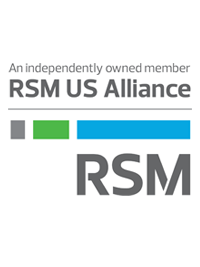Source: RSM US LLP. PBMares is a member of RSM US Alliance.
ARTICLE | June 02, 2021
What does the office of the post-pandemic future look like?
For a growing number of businesses, particularly in industries and divisions that proved capable of thriving in a virtual environment, the answer is a far cry from the team rooms, cubicle pods, and evershrinking personal spaces that defined the office environment of February 2020. Although the number of companies eliminating their office footprints entirely remains relatively small, the rising trend is toward leaner office spaces intended for regular use only by a limited number of key, local personnel.
After a year of pandemic, businesses have a good sense of the general benefits and detriments of a more remote, broadly dispersed workforce. At the forefront are a number of employee-relations considerations. From human resources issues such as hiring, training, and retaining workers, to infrastructure and investment concerns involving office leases, hardware, and software for remote employees, the long-term questions businesses face seem to multiply. With all of these issues clamoring for immediate board and management attention, it is too easy to forget about state and local taxes. But that would be a mistake—one that could cost your business dearly.
In general, a business that has employees working in a given state is subject to the tax jurisdiction of, or has tax nexus with, that state. Except in certain circumstances, one employee is enough, and it does not matter whether the employee performs an executive, solicitation, production, or administrative function. Virtual workforce opportunities have allowed employees to become transient, potentially increasing or reducing your state tax obligations.
With regard to the location of remote executives specifically, there are larger board concerns. Many states apply a “nerve center” test when sourcing certain types of receipts, such as investment receipts, for income and gross receipts tax purposes and when sourcing a business’s franchise value for franchise tax purposes. Thus, a billion-dollar gain from the sale of a subsidiary could be sourced entirely to the CEO’s home office or even vacation home office if that is where the decisions related to the sale were made. Understanding the applicable tests and closely managing where executive leadership makes key decisions are imperative in a virtual environment.
The full board and audit committee should ensure that they ask management to consider individual income tax withholding on employee and state unemployment insurance, as well.
The full board and audit committee should ensure that they ask management to consider individual income tax withholding on employee and state unemployment insurance, as well. In general, withholding and unemployment insurance are due to the state in which the employee performs their work. In a virtual environment, this will generally be the employee’s state of residence, but it may not be in instances where the employee has multiple homes.
Furthermore, sales and use tax considerations may be magnified in a virtual environment. From a process perspective, there will be new states to deal with, forms to file, and exemption certificates to keep and track. Deploying computers, peripherals, software, and technology-related services in states where employees reside may result in significant reporting costs and liability. Additionally, purchases of large-scale cloud services, such as enterprise cloud software or the use of remote servers and storage, may be subject to tax in multiple jurisdictions depending upon the application of state sourcing, first-use, and multiple-points-of-use rules. Particularly for businesses that have historically operated in a single state, these considerations may be a shock.
Many states offer a variety of credits and incentives based on the hiring, training, and relocation of employees and investment in real or tangible property. Some of these credits and incentives are statutory and merely require you to meet specified requirements. Others are negotiated and depend on the level of planned activity in the state. There are relatively few programs that are designed for a completely virtual workforce; however, the number and variety of these programs is increasing. Before you tell your employees that they can move anywhere, take advance action to determine whether and where these programs can benefit your business and employees, then you can let your employees know where they can go.
All of these state tax considerations may seem overwhelming, but every challenge can be overcome with careful planning, regular communication between the board and executive leadership, and having the right people in place to manage the process.
Article originally appeared in NACD’s Directorship magazine June/July 2021 issue.
This article was written by Brian Kirkell and originally appeared on Jun 02, 2021.
2022 RSM US LLP. All rights reserved.
https://rsmus.com/insights/services/business-tax/the-pandemic-may-not-be-over-but-the-office-as-we-knew-it-is.html
The information contained herein is general in nature and based on authorities that are subject to change. RSM US LLP guarantees neither the accuracy nor completeness of any information and is not responsible for any errors or omissions, or for results obtained by others as a result of reliance upon such information. RSM US LLP assumes no obligation to inform the reader of any changes in tax laws or other factors that could affect information contained herein. This publication does not, and is not intended to, provide legal, tax or accounting advice, and readers should consult their tax advisors concerning the application of tax laws to their particular situations. This analysis is not tax advice and is not intended or written to be used, and cannot be used, for purposes of avoiding tax penalties that may be imposed on any taxpayer.
RSM US Alliance provides its members with access to resources of RSM US LLP. RSM US Alliance member firms are separate and independent businesses and legal entities that are responsible for their own acts and omissions, and each are separate and independent from RSM US LLP. RSM US LLP is the U.S. member firm of RSM International, a global network of independent audit, tax, and consulting firms. Members of RSM US Alliance have access to RSM International resources through RSM US LLP but are not member firms of RSM International. Visit rsmus.com/aboutus for more information regarding RSM US LLP and RSM International. The RSM(tm) brandmark is used under license by RSM US LLP. RSM US Alliance products and services are proprietary to RSM US LLP.





